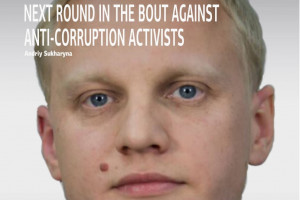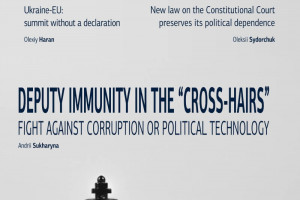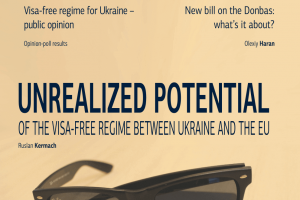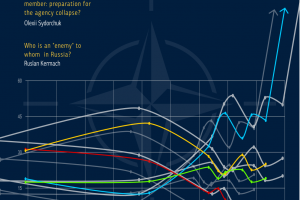POLITICAL SCANDALS AS A MANIFESTATION OF THE RISING SYSTEMIC TENSION IN UKRAINE
І. Overviews of political events of the week
December |
The meeting of the National Reform Council dedicated to the issue of privatization of state-owned enterprises ended in a scandal between Minister of Internal Affairs Arsen Avakov and Head of the Odesa Oblast State Administration Mikheil Saakashvili.Avakov accused the head of the Odesa OSA of “populism”, while Saakashvili accused Avakov of corruption calling him a “thief”.
December |
Poland came forth in favor of extending sanctions against Russia, Polish President Andrzej Duda stated during his 2-day visit to Ukraine. He further emphasized that the Republic of Poland has no intention of participating in or interfering in the work of the “Normandy format”, though it remains a proponent of the full implementation of the Minsk agreements. Besides that, the Polish president invited Ukraine to participate in the NATO Summit scheduled for the summer of 2016.
Replacement of the premier of Ukraine is not realistic, it reads in a joint statement of President Petro Poroshenko, Premier Arseniy Yatsenyuk and VR Speaker Volodymyr Groisman. In the statement the main tasks of the country’s leadership are to complete reforms and make amendments to the Constitution.
A Russian court sentenced Ukrainian citizen Velentyn Vyhovskiy to 11 years in a maximum security penitentiary based on accusations of espionage. He was detained in Crimea during his visit to the peninsula and then was transported to Russia. The Ministry of Foreign Affairs of Ukraine put Vyhovskiy on a list of political prisoners that were sentenced or are under investigation in Russia.
December |
The EU assessed the steps that Ukraine has taken on its path towards visa liberalization, EU President Jean-Claude Juncker and President of the European Council Donald Tusk stated at a summit briefing.
Ukrainian citizen Yuriy Soloshenko, who was sentenced by Russia for “espionage”, was imprisoned for six years in a maximum security penitentiary in the city of Nizhniy Novgorod. Soloshenko was sentenced for presumably attempting to purchase hardware to renew Ukraine’s anti-air defense system. As Soloshenko’s defense attorney Mark Fagen wrote on his Twitter, the Ukrainian citizen was forced to admit his guilt in exchange for serving his sentence in a Ukrainian prison.
The Kyiv District Administrative Court prohibited the activity of the Communist Party of Ukraine. In this way the court closed the case of the claim filed by the Ministry of Justice of Ukraine against the CPU regarding the banning of its activity.
Premier Arseniy Yatsenyuk informed that law enforcement bodies discovered a secret archive of documents of the family of ex-president Viktor Yanukovych in one of its apartments in Kyiv. In the archive original banking documents, real estate agreements and seals of several dozen offshore companies were found.
December |
The heads of states and governments of European Union member countries plan to confirm their consolidated position on extending the economic sanctions against Russia at s summit in Brussels, President of the European Council Donald Tusk stated.
The Cabinet of Minister of Ukraine plans to revise the draft budget over one week and next year will conduct tax reforms, Premier Arseniy Yatsenyuk stated from the rostrum of the Verkhovna Rada during an emergency session of the parliament. Meanwhile, the head of the faction of the Petro Poroshenko Bloc Yuriy Lutsenko stated that the state budget of Ukraine for 2016 will be confirmed on the basis of adjustments to the current Tax Code.
December |
The European Commission made public a positive report on the cancellation of the visa regime of Ukraine. In early 2016 a recommendation to implement a visa-free regime for Ukraine will be submitted to the Council of Europe.
POLITICAL SCANDALS AS A MANIFESTATION OF THE RISING SYSTEMIC TENSION IN UKRAINE
Last week the main attention of the Ukrainian public and the mass media was centered around the political scandal that flared up between Minister of Internal Affairs of Ukraine Arsen Avakov and Governor of the Odesa Oblast Mikheil Saakashvili during the session of the National Reform Council at the Presidential Administration. The formal reason for smoothing out relations between the two high-standing officials was the issue regarding the transparency of the process of privatization of the Odesa Portside Plant (OPP). Over the first half of the last week active discussions were held regarding the details of the conflict until a video of the session was made public in which Avakov and Saakashvili made harsh comments and accused one another of corruption.
The recent resonating conflict between Avakov and Odesa Oblast Governor Saakashvili during the session of the National Reform Council was the second scandalous event this month at the highest political level. Somewhat earlier MP from Petro Poroshenko Bloc Oleh Barna tried to forcefully pull Prime Minister Arseniy Yatsenyuk from the rostrum of the parliament during the latter’s address regarding the first year of work of the Cabinet of Ministers of Ukraine.
While both these events were direct, though not related to one another, they unequivocally sent a signal of the tangible rise in tension and the conflict between the political elites in Ukraine. Despite the fact that the local elections in Ukraine are long behind us, the political scandals continue to a great extent to define the order of the day in the information sphere in Ukraine. Such unfortunate dynamics might be dictated first and foremost by the attempts of those political forces interested in the sacking of the current government to change the current status quo in the system of the ruling power. Representatives of the ‘Batkivshchyna’ party, which significantly strengthened their political position during the latest local elections in Ukraine, certain representatives of the pro-presidential Petro Poroshenko Bloc, in particular representatives of the recently formed “anti-corruption platform” in the corresponding faction and, undoubtedly a whole specter of political parties that represent the opposition to the current Cabinet of Ministers (i.e. the Opposition Bloc are among those forces that) might be potentially interested in the change of the government.
However, as it appears after the recent joint statement by President of Ukraine, Prime-Minister and the Chairman of Verkhovna Rada of Ukraine regarding unity (the so-called “statement of the three”), the existing inter-institutional political balance of power will most likely be preserved.
The weakest link in the chain of Ukraine’s political system of coordinates seems to be the current head of the government Arseniy Yatsenyuk. The Prime Minister, just as the entire Cabinet of Ministers of Ukraine, were dealt a serious blow of public criticism this past autumn and basically ended up in the epicenter of the latest political scandals.
The steady loss of the peoples’ trust in Yatsenyuk, the resounding corruption scandal (the recent Martynenko affair) and at the same time the expiry of the term of immunity for the current Cabinet of Ministers open a favorable “window of opportunity” for political groups opposed to the ruling government in order to try to reformat or make full-scale changes to its composite, including the Prime Minister, who to a great degree has lost the support of the Ukrainian people.
At the same time, the aspirations of those political groups wanting to see changes in the system of power now face the obvious unwillingness of key political figures to change the current political status quo. This is clearly expressed in the aforementioned “statement of three”. Accordingly, totally realistic prerequisites arise for an increase of systemic tension in Ukraine’s political environment together with the attempts of the aforementioned political groups interested in the change of government to undermine the existing fragile balance of power from the inside. Those occasions of sending out scandalous information could very well be the instrument that would shake the power mechanism with obstreperous disclosure and insufficiently grounded accusations of corruption, which have lately been made at the highest political level in Ukraine.
The increase in sharp and insurmountable contradictions between the conditionally moderate conservative wing of reformists in the Cabinet of Ministers and the wing of politicians that position themselves as radical reformists headed by the current governor of the Odesa oblast Saakashvili could be another dimension of the recent political scandal in which minister Avakov and Saakashvili were engaged. In light of the insufficient base of evidence of the latter regarding the possible corruption component in the activity of current government officials, the producing of resonating information pretexts to remove Yatsenyuk from his post as Prime Minister might serve as the only real instrument of influencing the current configuration in the system of power.
Conclusions
In closing, the political scandals of the past weeks in Ukraine, among other things, may send a signal of a rise in tension between the political elites as well as to indicate the desire of those interested in changing the current status quo to take advantage of the shaky positions of the current government with the aim of speeding up the possibility of its dismissal or at the very least its fundamental reformatting. However, the unwillingness of key political figures to change the current government of Arseniy Yatsenyuk only deepens the internal political contradiction manifested in the political scandals and public attempts to uncover the relations between high-standing government officials. All the more, acquiring routine nature, such public conflicts and political scandals one way or another undermine the trust of the people in Ukraine’s institutions of power both inside the country and on the international arena.
“Focus оn Ukraine” – weekly informational-analytical news bulletin prepared by the Ilko Kucheriv Democratic Initiatives Foundation (http://dif.org.ua).
DIF Analysts:
Iryna Bekeshkina
Oleksiy Haran
Ruslan Kermach
Oleksiy Sydorchuk
Maria Zolkina
Editor-in-chief: Iryna Filipchuk








